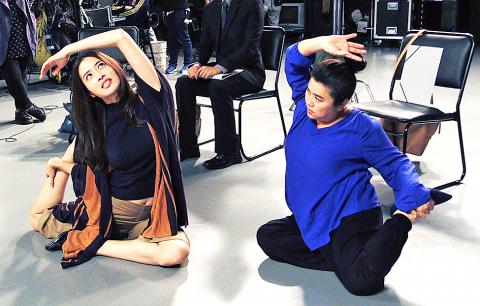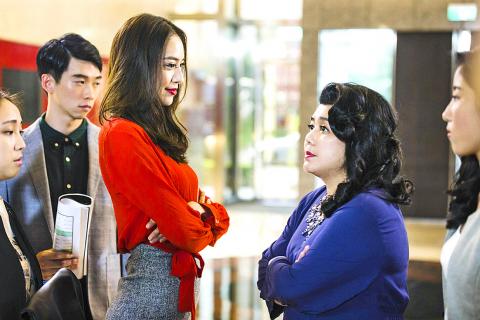You can’t escape it — almost every mainstream Taiwanese movie has to come with the trademark characteristics of cuteness, sappiness and over-the-top absurdity. Those ingredients are clearly present in Ace of Sales, complete with the ubiquitous flamboyant gangster (Jack Na, 那維勳) who inexplicably finishes his sentences in poor English — but somehow it is bearable here; perhaps even endearing ... nah, we won’t go that far.
But perhaps because Ace of Sales is a heartwarming comedy not about the fire of youth (it features live, working, married adults), the screenwriters could not simply run amok with gimmicks presumably targeted toward the 15-and-under crowd. There has to be some substance in a film dealing with life in the workplace, and while the result is nothing groundbreaking, it makes a “well-balanced” mainstream film — in that it provides as many chuckles as cliches and as many heartfelt smiles as cringes. But most of all, the subject material is fresh — it actually takes the viewer through a maybe exaggerated but still interesting look into the world of the television shopping industry.
We’ve all seen on television the weirdly enthusiastic people selling once-in-a-lifetime-deal jewelry, invisible bras and magical sports equipment that can give you a flat belly. This film delves into the heart of it as protagonist Sue (Bianca Bai, 白歆惠) loses her job as a marketing and communications specialist and ends up working as a salesperson at Carrefour. Shy and awkward in the beginning, Sue learns how to make people buy things through a series of bizarre events and eventually becomes the alpha on a television shopping channel.

Photo courtesy of Hualien Media
Bai does a pretty nuanced job with her role, especially playing the awkwardness and introversion well, and you can still see traces of it even as she transitions into success. She enters a rivalry with Mei-hsiu (林美秀, Lin Mei-hsiu), who, despite being older, unattractive and loudmouthed, is also a wildly successful salesperson in her own right. Although their interaction is pretty formulaic as far as workplace battles go, Mei-hsiu provides a contrasting counterpart to Sue that does result in some laughs.
The plot itself flows well, with enough ups and downs and tension to keep the viewer engaged throughout the 129 minutes of running time — but the relationship development between the characters is pretty weak. For example, while Sue’s ridiculously sweet yet timid husband Kai (Nadow, 納豆) plays an important part in the first part of the film, there is almost no interaction to show between the two for a long stretch as their relationship supposedly deteriorates. Other characters go through abrupt attitude or personality changes that are crucial for the story but are simply hard to believe. Even the way Sue finds her final catharsis feels forced and unnatural. And the side love story between Jack, the gangster, and the person who turns out to be the villain resolved and explained in a disappointingly lazy fashion
Using a niche industry as a main theme is a good idea for a movie, but it seems that the production team put too much effort into stuffing too much into a film in an attempt to make it appealing on all fronts. That is the pitfall of trying to please all audiences — you often end up with a slickly-produced film that really is not bad — and while it is indeed enjoyable to watch, you can’t help but walk out thinking that it could have been much better.

Photo courtesy of Hualien Media

Photo courtesy of Hualien Media

May 11 to May 18 The original Taichung Railway Station was long thought to have been completely razed. Opening on May 15, 1905, the one-story wooden structure soon outgrew its purpose and was replaced in 1917 by a grandiose, Western-style station. During construction on the third-generation station in 2017, workers discovered the service pit for the original station’s locomotive depot. A year later, a small wooden building on site was determined by historians to be the first stationmaster’s office, built around 1908. With these findings, the Taichung Railway Station Cultural Park now boasts that it has

The latest Formosa poll released at the end of last month shows confidence in President William Lai (賴清德) plunged 8.1 percent, while satisfaction with the Lai administration fared worse with a drop of 8.5 percent. Those lacking confidence in Lai jumped by 6 percent and dissatisfaction in his administration spiked up 6.7 percent. Confidence in Lai is still strong at 48.6 percent, compared to 43 percent lacking confidence — but this is his worst result overall since he took office. For the first time, dissatisfaction with his administration surpassed satisfaction, 47.3 to 47.1 percent. Though statistically a tie, for most

As Donald Trump’s executive order in March led to the shuttering of Voice of America (VOA) — the global broadcaster whose roots date back to the fight against Nazi propaganda — he quickly attracted support from figures not used to aligning themselves with any US administration. Trump had ordered the US Agency for Global Media, the federal agency that funds VOA and other groups promoting independent journalism overseas, to be “eliminated to the maximum extent consistent with applicable law.” The decision suddenly halted programming in 49 languages to more than 425 million people. In Moscow, Margarita Simonyan, the hardline editor-in-chief of the

Six weeks before I embarked on a research mission in Kyoto, I was sitting alone at a bar counter in Melbourne. Next to me, a woman was bragging loudly to a friend: She, too, was heading to Kyoto, I quickly discerned. Except her trip was in four months. And she’d just pulled an all-nighter booking restaurant reservations. As I snooped on the conversation, I broke out in a sweat, panicking because I’d yet to secure a single table. Then I remembered: Eating well in Japan is absolutely not something to lose sleep over. It’s true that the best-known institutions book up faster